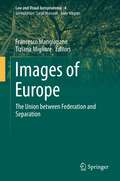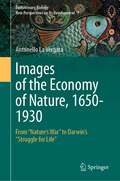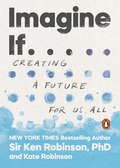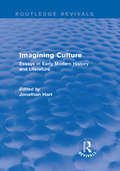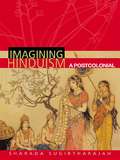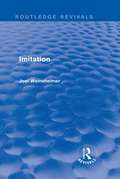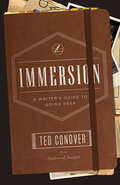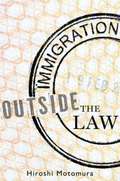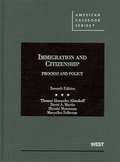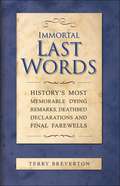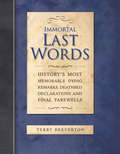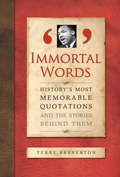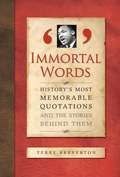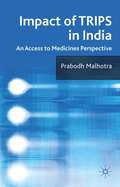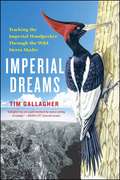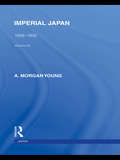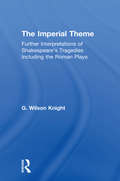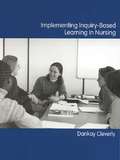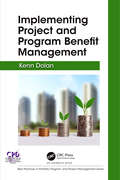- Table View
- List View
Images of Blind and Visually Impaired People in the Movies, 1913-1985: An Annotated Filmography with Notes
by Diane Wolfe Wendy EricksonListed in this book are the titles and other information about movies that include characters who are blind or visually impaired.
Images of Europe: The Union between Federation and Separation (Law and Visual Jurisprudence #4)
by Francesco Mangiapane Tiziana MiglioreThis book deals with the fundamental semantics of images of Europe, which consist of valences, mirror beliefs and affectivities. This is why it relaunches the importance of the European discourse in its symbolic dimension. As such, it explores the many images of Europe, or rather the many images through which European discourse is actually constituted in daily life, in search of their enunciative responsibility in today’s world for determining the current “State of the Union”. The identity of the European continent is based on a millenary tension between universalism and particularism: images of Europe have in fact been alternately inspired, over the centuries, by a model of homogeneity – Roman and Carolingian imperial disposition – on the one hand, and by a model of fragmentation – a Europe of city-states, municipalities, regions and small fatherlands – on the other. In the European Union, a political and economic organism, this issue has recently been amplified to the point that it has reentered public debate, and political parties that are only recognizable for being Europeanists or anti-Europeanists are now ubiquitous. In this regard, one major bone of contention is how to portray the quintessential aspects of the European territory, which are either interpreted as “thresholds” to be overcome in the name of a model of United Europe – “integral totality” – or are instead regarded as insurmountable obstacles for a Europe that is irreparably and perhaps, according to anti-Europeanists, fortunately fragmented – “partitive totality”. Further, this is to be done without excluding the possibility of contradictory and complementary solutions to these binary visions. In this context the book analyzes various texts in order to obtain a more precise picture of the clash, reveal its semiotic forms, and by doing so, identify a way out of the crisis.
Images of the Economy of Nature, 1650-1930: From "Nature’s War" to Darwin’s "Struggle for Life" (Evolutionary Biology – New Perspectives on Its Development #7)
by Antonello La VergataThe book discusses ideas concerning the order and balance of nature (or "economy of nature") from the late 17th century to the early 20th century. The perspective taken is broad, longue durée and interdisciplinary, and reveals the interplay of scientific, philosophical, moral and social ideas. The story begins with natural theology (dating roughly to the onset of the so-called Newtonian Revolution) and ends with the First World War. The cut-off date has been chosen for the following reasons: the war changed the state of things, affecting man’s way of looking at, and relating to, nature both directly and indirectly; indeed, it put an end to most applications of Darwinism to society and history, including interpretations of war as a form of the struggle for existence. The author presents an overview of the different images of nature that were involved in these debates, especially in the late 19th century, when a large part of the scientific community paid lip service to ‘Darwinism’, while practically each expert felt free to interpret it in his own distinct way. The book also touches on the so-called ‘social Darwinism’, which was neither a real theory, nor a common body of ideas, and its various views of society and nature’s economy. Part of this book deals with the persistence of moralizing images of nature in the work of many authors. One of the main features of the book is its wealth of (detailed) quotations. In this way the author gives the reader the opportunity to see the original statements on which the author bases his discussion. The author privileges the analysis of different positions over a historiography offering a merely linear narrative based on general implications of ideas and theories. To revisit the concept of the so-called "Darwinian Revolution", we need to examine the various perspectives of scientists and others, their language and, so to speak, the lenses they used when reading "facts" and theories. The book ends with some general reflections on Darwin and Darwinisms (the plural is important) as a case study on the relationship between intellectual history, the history of science and contextual history.Written by a historian, this book really gives new, multidisciplinary perspectives on the "Darwinian Revolution."
Imagine If . . .: Creating a Future for Us All
by Sir Ken Robinson Kate RobinsonA call to action that pulls together all of Sir Ken Robinson&’s key messages and philosophies, and that challenges and empowers readers to re-imagine our world, and our systems, for the better.Sir Ken Robinson changed the lives of millions of people. The embodiment of the prestigious TED conference, his TED Talks are watched an average of 17,000 times a day--a figure that Chris Anderson, Head of TED, says is the equivalent of selling out the Millennium Dome every night for fifteen consecutive years. A New York Times bestselling author, Sir Ken&’s books have been translated into twenty four languages. In his final years, Sir Ken was working on a book that would serve as his manifesto. This book was being written for both new and dedicated audiences alike as a coherent overview of the arguments that he dedicated his life to, and as a pivotal piece of literature for the education revolution he began. When Sir Ken received his cancer prognosis in August 2020 he asked his daughter and collaborator, Kate Robinson, to finish writing this manifesto and continue his work. At its core, Sir Ken&’s work is a love letter to human potential--a celebration of what we as a species are capable of doing, and of being, if we create the right conditions. It is a rallying cry to revolutionize our systems of education, and the ways in which we run our businesses and structure our social systems, so that they bring out the best in each and every person. Sir Ken often observed that what separates us from the rest of life on Earth is our power of imagination: the ability to bring to mind things that are not present to our senses. It is imagination that allows us to create the world in which we live, rather than just exist in it. It also gives us the power to recreate it.
Imagining Culture: Essays in Early Modern History and Literature (Routledge Revivals #1)
by Jonathan HartImagining Culture, first published in 1996, discusses literature as a whole rather than a partisan interest in those who are in or out of favour, and how that literature relates to other arts as well as to philosophical, historical, and cultural contexts. This title will be of interest to students of literature and cultural studies.
Imagining Hinduism: A Postcolonial Perspective
by Sharada SugirtharajahImagining Hinduism examines how Hinduism has been defined, interpreted and manufactured through Western categorizations, from the foreign interventions of eighteenth and nineteenth-century Orientalists and missionaries, to the present day. Sugirtharajah argues that ever since early Orientalists 'discovered' the ancient Sanskrit texts and the Hindu 'golden age', the West has nurtured a complex and ambivalent fascination with Hinduism, ranging from romantic admiration to ridicule. At the same time, Hindu discourse has drawn upon Orientalist representations in order to redefine Hindu identity.As the first comprehensive work to bring postcolonial critique to the study of Hinduism, this is essential reading for those seeking a full understanding of Hinduism.
Imitation (Routledge Revivals)
by Joel WeinsheimerIn this book, first published in 1984, Joel Weinsheimer advocates revitalizing the practice of imitating literature as a mode appropriate for literary critics as well as artists. The book is not only about imitation; it is itself an imitation, specifically of Samuel Johnson. As both the focus and mode of presentation, imitation is presented not merely as a kind of poetry that once flourished in the eighteenth century but also as a kind of criticism particularly relevant today. Applying arguments from philosophy of science, deconstruction, psycho-analysis, literary theory, semiotics and hermeneutics, Weinsheimer shows that the three main currents of thought responsible for forcing imitation underground were empiricism, originalism and historicism. The three central chapters of the book concentrate on their representatives: John Locke, Edward Young and Thomas Warton. The author then applies Johnsonian arguments – supported by those of Gadamer Peirce – to challenge those objections and re-establish imitation as an intellectually defensible mode of writing.
Immersion: A Writer's Guide to Going Deep (Chicago Guides to Writing, Editing, and Publishing)
by Ted ConoverOver three and a half decades, Ted Conover has ridden the rails with hoboes, crossed the border with Mexican immigrants, guarded prisoners in Sing Sing, and inspected meat for the USDA. His books and articles chronicling these experiences, including the award-winning Newjack: Guarding Sing Sing, have made him one of the premier practitioners of immersion reporting. In immersion reporting--a literary cousin to ethnography, travel writing, and memoir--the writer fully steps into a new world or culture, participating in its trials, rites, and rituals as a member of the group. The end results of these firsthand experiences are familiar to us from bestsellers such as Nickel and Dimed and Behind the Beautiful Forevers. But in a world of wary strangers, where does one begin? Conover distills decades of knowledge into an accessible resource aimed at writers of all levels. He covers how to "get into" a community, how to conduct oneself once inside, and how to shape and structure the stories that emerge. Conover is also forthright about the ethics and consequences of immersion reporting, preparing writers for the surprises that often surface when their piece becomes public. Throughout, Conover shares anecdotes from his own experiences as well as from other well-known writers in this genre, including Alex Kotlowitz, Anne Fadiman, and Sebastian Junger. It's a deep-in-the-trenches book that all aspiring immersion writers should have in hand as they take that first leap into another world.
Immigration Law Handbook (2013 Edition)
by Company Matthew BenderThis fully updated Immigration Law Handbook contains the complete and updated primary law that immigration and homeland security professionals need on a daily basis.
Immigration Law Pocket Field Guide
by LexisnexisA convenient, up-to-date summary of the law for immigration officers and other professionals.
Immigration Law Pocket Field Guide 2015 Edition
by The Editors at the LexisNexisThis latest edition of the Immigration Law Pocket Field Guide from LexisNexis is an essential item in the pocket of any law enforcement professional who deals with immigration law on a regular basis.
Immigration Law and Defense National Lawyers Guide: Volume 2
by Philip HornikThis publication was created to provide you with accurate and authoritative information concerning the subject matter covered; however, this publication was not necessarily prepared by persons licensed to practice law in a particular jurisdiction. The publisher is not engaged in rendering legal or other professional advice and this publication is not a substitute for the advice of an attorney. If you require legal or other expert advice, you should seek the services of a competent attorney or other professional.
Immigration Outside the Law
by Hiroshi MotomuraThe main aim of the book is to offer a way to think about why immigration law is an area of ambivalence and disagreement and to assess and suggest responses to unauthorized migration.
Immigration and Citizenship: Process and Policy (7th Edition)
by David A. Martin Maryellen Fullerton T. Alexander Aleinikoff Hiroshi MotomuraThe seventh edition of this pioneering casebook continues its tradition of comprehensive coverage, with problems and exercises that allow students to hone skills as counselors, as litigators, and as policy advisors. At the same time, the casebook situates immigration and citizenship law within broader contexts of constitutional and administrative law as well as current political debates. This new edition is reorganized for more efficient coverage, with an introductory chapter on immigration history; treatment of unauthorized migration alongside lawful admissions; consolidated treatment of inadmissibility and deportability; reworked materials on state and local enforcement; and thorough redesign of materials on criminal convictions.
Immortal Last Words
by Terry BrevertonImmortal Last Words is a fascinating, diverse collection of history's most uplifting, entertaining and thought-provoking dying remarks and final farewells. The 370 entries in this book have been drawn from some of history's greatest statesmen, poets, scientists, novelists and warriors--the eminent men and women who have shaped events over the last four and a half millennia and whose final recorded words have often inspired great deeds or shed light on the nature of the human condition. There are also entries are from less well- known individuals who did not make such an impact on history but whose dying words are equally noteworthy as they encapsulate the spirit of the times or simply reflect the character of the speaker. And finally, the pages of this book contain the last words of some of most ignoble personalities in history--the monsters and maniacs whose final defiant utterances prompt us to reflect on the nature of evil and man's inhumanity to man. Arranged chronologically from antiquity to the present day, each entry is accompanied by contextual information giving a brief biography of the author and an explanation of the circumstances that gave rise to the quotation. Some of the sentiments expressed are unbelievably sad while others are optimistic; some final words have become famous while others have remained obscure, but all reflect the follies and greatness of mankind--its heroes and villains, war and peace and the absolute power of language to change our feelings and challenge our minds.
Immortal Last Words: History's Most Memorable Quotations and the Stories Behind Them
by Terry BrevertonImmortal Last Words is a fascinating, diverse collection of history's most uplifting, entertaining and thought-provoking dying remarks and final farewells. The 370 entries in this book have been drawn from some of history's greatest statesmen, poets, scientists, novelists and warriors - the eminent men and women who have shaped events over the last four and a half millennia and whose final recorded words have often inspired great deeds or shed light on the nature of the human condition. There are also entries are from less well- known individuals who did not make such an impact on history but whose dying words are equally noteworthy as they encapsulate the spirit of the times or simply reflect the character of the speaker. And finally, the pages of this book contain the last words of some of most ignoble personalities in history - the monsters and maniacs whose final defiant utterances prompt us to reflect on the nature of evil and man's inhumanity to man. Arranged chronologically from antiquity to the present day, each entry is accompanied by contextual information giving a brief biography of the author and an explanation of the circumstances that gave rise to the quotation. Some of the sentiments expressed are unbelievably sad while others are optimistic; some final words have become famous while others have remained obscure, but all reflect the follies and greatness of mankind - its heroes and villains, war and peace and the absolute power of language to change our feelings and challenge our minds. Sample entries include:Buddha 'Strive for your own liberation with diligence'; Vespasian 'Dear me, I believe I am becoming a god'; Thomas Hobbes, 'I am about to take my last voyage, a great leap in the dark'; Robespierre 'Death is the commencement of immortality!'; George Washington'Tis well'; John Keats 'Here lies one whose name was writ in water'; John Maynard Keynes'I should have drunk more champagne'; Salvador Dalí 'I do not believe in my death'; Keith Floyd 'I've not felt this well for ages.'
Immortal Last Words: History's Most Memorable Quotations and the Stories Behind Them
by Terry BrevertonImmortal Last Words is a fascinating, diverse collection of history's most uplifting, entertaining and thought-provoking dying remarks and final farewells. The 370 entries in this book have been drawn from some of history's greatest statesmen, poets, scientists, novelists and warriors - the eminent men and women who have shaped events over the last four and a half millennia and whose final recorded words have often inspired great deeds or shed light on the nature of the human condition. There are also entries are from less well- known individuals who did not make such an impact on history but whose dying words are equally noteworthy as they encapsulate the spirit of the times or simply reflect the character of the speaker. And finally, the pages of this book contain the last words of some of most ignoble personalities in history - the monsters and maniacs whose final defiant utterances prompt us to reflect on the nature of evil and man's inhumanity to man. Arranged chronologically from antiquity to the present day, each entry is accompanied by contextual information giving a brief biography of the author and an explanation of the circumstances that gave rise to the quotation. Some of the sentiments expressed are unbelievably sad while others are optimistic; some final words have become famous while others have remained obscure, but all reflect the follies and greatness of mankind - its heroes and villains, war and peace and the absolute power of language to change our feelings and challenge our minds. Sample entries include:Buddha 'Strive for your own liberation with diligence'; Vespasian 'Dear me, I believe I am becoming a god'; Thomas Hobbes, 'I am about to take my last voyage, a great leap in the dark'; Robespierre 'Death is the commencement of immortality!'; George Washington'Tis well'; John Keats 'Here lies one whose name was writ in water'; John Maynard Keynes'I should have drunk more champagne'; Salvador Dalí 'I do not believe in my death'; Keith Floyd 'I've not felt this well for ages.'
Immortal Last Words: History's Most Memorable Quotations and the Stories Behind Them
by Terry BrevertonImmortal Words is an anthology of history's most memorable, uplifting or thought-provoking quotations from all ages and nations. The texts are drawn not only from the works and words of great writers, thinkers and orators, but also from less well-known sources such as gravestones, book dedications, speeches and political manifestos, letters and diaries, inscriptions and chance remarks. Each of the 370 quotations is accompanied by an extended annotation that tells the story of the speaker or explains the circumstances that gave rise to the quotation. The words and sentiments expressed have been used to encapsulate the human condition, to inspire great works or deeds in times of hardship, or simply reflect the spirit of the time - they will live with you and inspire you day by day, from one year's end to the next. Sample entries include:Marcus Aurelius - 'Nowhere can a man find a quieter or more untroubled retreat than in his own soul …'. Martin Luther King - 'I have a dream …'. John F. Kennedy - 'Ask not, what your country …'. John Gillespie Magee, Royal Air Force pilot, 1941 - 'High Flight'. Ronald Reagan - 'Tear down his wall …'. Isadora Duncan - on her sickbed, writes a feverishly passionate letter to her lover, the actor Gordon Craig. Mother Teresa of Calcutta - 'Life is …'. Colonel Tim Collins of the Royal Irish Regiment, March 19 2003 - 'We come not to conquer …''. Emma Lazarus - 'The New Colossus' (plaque on Statue of Liberty). Joseph Stalin - first broadcast to the Russian people after the German invasion, July 3 1941. Mahatma Gandhi - 'I am a man of peace …'. Abraham Lincoln - on leaving Springfield, Illinois, to take the oath as President. February 11, 1861. Cicero - quoting Cato the Elder, in De Senectute (On Old Age), 44 BC. Charles Lindbergh - describing the last minutes of his pioneering non-stop flight from New York to Paris in 1927. Nelson Mandela - 'I am the First Accused'. Buddha - 'All acts of living creatures become bad by ten things …'. Benjamin Franklin - writes a first draft of his own epitaph. Thomas Jefferson - 'Force cannot change right … Winston Churchill - 'Never in the field of human conflict …'. Adolf Hitler - 'My patience is now at an end'. Edward Everett - President of Harvard on the protest of the student body against the admission of a Negro student. Francis Bacon - 'This world's a bubble; and the life of Man Less than a span …'. Horatio Nelson - 'Separated from all I hold dear in this world …'. Charlotte Cushman - inscription on the curtain of Ford's Opera House, Baltimore. Shakespeare - 'Once more unto the breach …' Henry V. Marie Antoinette - letter to her sister on the day of her execution. Ludwig Van Beethoven - 'I carry my ideas about me for along time, often a very long time…'. Aldous Huxley 1920- 'A million million spermatozoa …'. Eleanor Roosevelt - speaking on the function of hatred in a just cause. Indira Gandhi - 'Women's education is almost more important than the education of boys and men.'
Immortal Words
by Terry BrevertonImmortal Words is an anthology of history's most memorable, uplifting and thought-provoking quotations from all ages and nations. The texts are drawn not only from the works and words of great writers, thinkers and orators, but also from less well-known sources such as gravestones, book dedications, speeches and political manifestos, letters and diaries, inscriptions and chance remarks. Each of the 370 quotations is accompanied by an extended annotation that tells the story of the speaker or explains the circumstances that gave rise to the quotation. The words and sentiments expressed have been used to encapsulate the human condition, to inspire great works or deeds in times of hardship, or simply reflect the spirit of the time--they will live with you and inspire you day by day, from one year's end to the next.
Impact of TRIPS in India
by Prabodh MalhotraIn India today only 35 percent of people have access to medicines. This book examines the rise of drug prices in India, and develops a new healthcare model, which if implemented, would extend access to medicines to India's entire population. Sensitivity tests show that the proposed model is affordable, equitable and implementable
Imperial Dreams: Tracking the Imperial Woodpecker Through the Wild Sierra Madre
by Tim GallagherA decade ago, Tim Gallagher was one of the rediscoverers of the legendary ivory-billed woodpecker, which most scientists believed had been extinct for more than half a century—now Gallagher once again hits the trail, journeying deep into Mexico&’s savagely beautiful Sierra Madre Occidental, home to rich wildlife, as well as to Mexican drug cartels, in a perilous quest to locate the most elusive bird in the world—the imperial woodpecker.The imperial woodpecker&’s trumpetlike calls and distinctive hammering on massive pines once echoed through the high forests. Two feet tall, with deep black plumage, a brilliant snow-white shield on its back, and a crimson crest, the imperial woodpecker had largely disappeared fifty years ago, though reports persist of the bird still flying through remote mountain stands. In an attempt to find and protect the imperial woodpecker in its last habitat, Gallagher is guided by a map of sightings of this natural treasure of the Sierra Madre, bestowed on him by a friend on his deathbed. Charged with continuing the quest of a line of distinguished naturalists, including the great Aldo Leopold, Gallagher treks through this mysterious, historically untamed and untamable territory. Here, where an ancient petroglyph of the imperial can still be found, Geronimo led Apaches in their last stand, William Randolph Hearst held a storied million-acre ranch, and Pancho Villa once roamed, today ruthless drug lords terrorize residents and steal and strip the land. Gallagher&’s passionate quest takes a harrowing turn as he encounters armed drug traffickers, burning houses, and fleeing villagers. His mission becomes a life-and-death drama that will keep armchair adventurers enthralled as he chases truth in the most dangerous of habitats.
Imperial Japan: 1926-1938 (Routledge Library Editions: Japan)
by A Morgan YoungA journalist on the Japan Chronicle for eleven years, the author collected in this volume the most significant current events for discussion. They include the financial crisis of 1927, hostilities with China and in particular Manchuria, Japan’s booming manufacturing industry, Japanese nationalism, Japan’s new empire and its place within the Far East and East Asia. Written from a Western perspective, the volume nonetheless presents a balanced view of Japan and its behaviour which only close observation and dealings with the Japanese people could make possible.
Imperial Theme - Wilson Knight: Further Interpretations Of Shakespeare's Tragedies Including The Roman Play
by G. Wilson KnightFirst Published in 2002. Routledge is an imprint of Taylor & Francis, an informa company.
Implementing Inquiry-Based Learning in Nursing
by Dankay CleverlyIf you want to introduce Inquiry-Based Learning (IBL) into your curriculum but are not sure how to go about it, this book will set you on the right track. In this text the author shares the experience of leading a project to implement IBL as a whole integrated pre-registration curriculum and provides a blueprint for successful implementation.The practicalities of implementing IBL can be a daunting prospect. Using a wealth of examples, relevant theories, models and research, this book takes the reader through the logistics of every stage of implementation. It provides the necessary theoretical and research perspectives and describes the detail how to manage the project stage by stage, covering planning, implementation, evaluation and change management. In addition, it looks at the operational practicalities and describes eight subprojects: staff development; communication systems; the classroom compass; practice experience; documentation; electronic' library and media resources, as well as reviewing the post implementation situation.Whether you are new to or already familiar with Inquiry-Based Learning or simply need some practical guidelines, this book will provide an indispensable source of reference.
Implementing Project and Program Benefit Management (Best Practices in Portfolio, Program, and Project Management)
by Kenn DolanOne of the most difficult, yet important, questions regarding projects is "What advantages will this project create for the investors and key stakeholders?" Projects and programs should be treated as investments. This means that the focus of projects shifts from delivering within the triple constraints (time–cost–quality) towards some of the more fundamental questions: <P><P> <li>What is the purpose of this investment? <li>What are the specific advantages expected? <li>Are these benefits worth the investment? <P><P>Implementing Project and Program Benefit Management is written for executives and practitioners within the portfolio, program, and project environment. It guides them through the important work that must be addressed as the investment progresses towards the realization of benefits. The processes discussed cover the strategic elements of benefits realization as well as the more detailed requirements, which are the domain of the program delivery teams and the operational users. Using real cases to explain complex situations, operational teams and wider groups of stakeholders, including communities affected by infrastructure projects, will be able to engage in the conversation with the sponsors and delivery teams. <P><P>Covering an area of program and project management that is rapidly becoming more widely valued, this book blends theory with practical experience to present a clear process flow to managing the benefits life cycle. Best practices are defined, and pitfalls and traps are identified to enable practitioners to apply rigor and structure to this crucial discipline.

